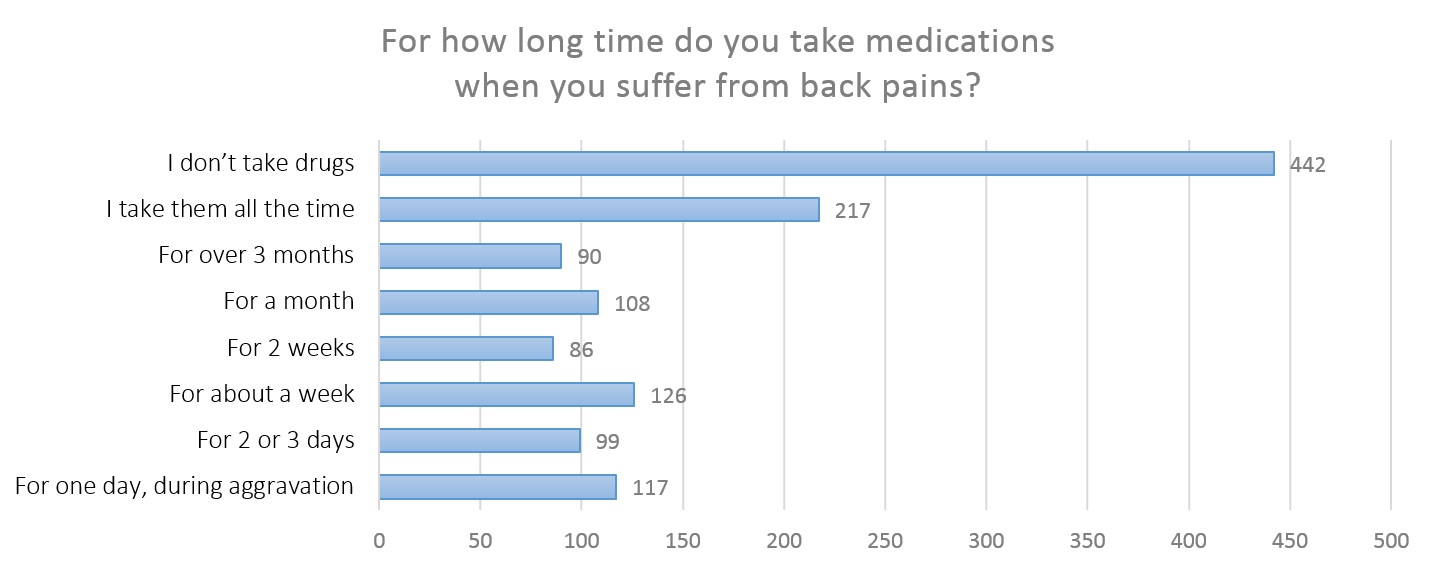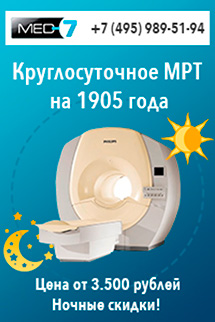Medicines for back pains
Analgetics are the most simple and effective way to relieve any pain, including chronic or acute back pain. It is assumed that the vast majority of people who suffer from spine problems, resort to help of medicines, but the results of a poll we held show that there are not so many people who take pain killers all the time. Much more often our respondents prefer to manage without medicines at all, or to take them during periods of aggravation. Refusal of drugs has reasonable grounds to do so because long-term ingestion of pain killers has a negative effect on people’s health.

What do people “get hooked on” when they suffer from back pains?
All the drugs that are used for back pains can be divided into narcotic and non-narcotic analgetics. The first group includes “crushing” remedies, which are effective even for very severe pains. Non-narcotic analgetics are more widespread medications, they are used much more often. Such medicines either don't include narcotic substances at all, or contain small doses of them.
Opium and all sorts of derivatives of it have been have been used for pain control in medicine since long ago. Up to the middle of the last century morphium was sold freely at pharmacies, and jaded nerves were treated with laudanum, an opium alcoholic tincture. But opium as such causes addiction quickly. Therefore the doctors had to give up on using its “services”. Opium was replaced with narcotic substances associated with it: codeine, papaverine, morphine. If you read the formula of many well-known medications carefully, you will most certainly find slight traces of narcotic substances there. For example, the popular pain killer Nurofen Plus contains codeine.
Codeine and all the medications that contain it are a wonderful, just splendid remedy for relieving back pain. If you are among those respondents who take analgetics for one or two days during periods of aggravation, you have no reasons for worrying. Even if you use medicines containing codeine for that purpose. Do we really need to explain what long-term intake of such medications can lead to? Oh yes, they will induce habituation. How does it show up? The medicine will stop being effective for you. The doses, which used to pacify the pain instantly, will not help any more. And non-narcotic analgetics will not help at all. You will have to increase the dose of your medicine again, again and again.
Except for the addiction as such, taking pain killers associated with narcotic substances reflect adversely on the state of the nervous system, they have a great deal of side effects. Of course, such medications are available only on prescription, but many patients display amazing perseverance at persuading their doctor that only this and no other pain killer can help them.
Sadly, if you need to take such medicines for a long time, time may have come for a surgical intervention or a serious course of treatment? Codeine addiction is a real problem, not a mythic one. According to the data resulting from some studies, about 32 thousands people in the country suffer from such addiction. And the doctors who prescribe the medications don’t know anything about the problem because the patients feel embarrassed to complain. At the same time, constant intake of pain killers is considered a socially acceptable thing, so this specific kind of drug addiction “flourishes”.
Narcotic analgetics are: Tramal (Tramadol), Indalgin, Promedol, Valoron (Tilidin), Codeine phosphate and others.
Analgetics and non-steroidal anti-inflammatory drugs
Much more often we use for back pain what we have close at hand: non-narcotic analgetics. Such medicines can be found in every home: these are the same analgin and paracetamol. Often they go hand in hand with narcotic drugs: for example, codeine and Paracetamol [1] can be used at the same time. But the priority in treatment of back pains belongs to diclofenac sodium and COX-2 selective inhibitor meloxicam (meloxam). Inhibitors are a separate topic.
Inhibitors are non-steroidal anti-inflammatory agents. They are divided into 2 categories: non-selective inhibitors of cyclooxygenase (COX) enzyme and selective inhibitors of cyclooxygenase-2. The first category included Nurofen and Ibalgin that are well-known for everyone, and also quite a number of ointments, gels and injections for low back pain. COX-2 can also be of various pharmaceutical forms, but whichever form is used, such medicines are always more preferable. Why is it so? COX-2, unlike COX, doesn’t have so many side effects. Non-narcotic analgetics has the most adverse effect on the digestive system, but as for meloxicam, for example, the negative effect is minimized. Neverheless, the longer you take such medicines, the more probable is occurrence of side effects.
There are also muscle relaxants and neurotropic vitamin B complexes, they are indicated for treatment of back pains too. The first group of medicines suppresses spinal nerves activity, the second group doesn’t only arrest the pain syndrome but also helps nerves regenerate. However, vitamins are often used together with lidocaine, which blocks nervous impulses effectively.
Non-narcotic analgetics are: Analgin, Diclofenac, Ketanov, Ketonal, Paracetamol, and so on.
What is the danger of long-term intake of pain killers?
So, as for narcotic medications, all is clear – they induce addiction, and damage the nervous system. But why is long-term intake of non-steroidal analgetics, muscle relaxants and other “harmless” medicines so bad? All non-steroidal anti-inflammatory agents have one and the same problem – they aren’t a panacea but a two-edged sword. Analgetics, which are taken for back pains so often, “kill” the liver. They are safe in small doses, after all, there is no alternative that would be completely safe, but long-term intake of them affects the state of the liver adversely. Besides that, specialists point at such general side effects, which are typical for most medications of this group, as hemorrhages, cardiovascular disorders, gastric entropies [6].
One would think, what harm can paracetamol do? If you take it regularly, especially if it is more than one tablet a day, it can lead to development of renal failure. Separate components of the medicine accumulate in the kidneys, and this, in its turn, causes disorders in their functioning and death of kidney cells. Also many pain killers, including paracetamol, promote development of kidney cancer. Aspirin is safe for the kidneys, but has its own drawbacks. For example, Australian researchers have come to the conclusion that taking this drug for a long time provokes vision problems [2]. Also there is risk of internal hemorrhages, and in women it can even cause pancreatic cancer [3]. As for diclofenac, always loved by those who suffer from chronic back pains, it affects the gastrointestinal tract. The biggest risk exists for elderly people, those who like greasy food and alcohol, heavy smokers [4]. For those who have ulcers, diclofenac is a real danger: it can become the reason of internal hemorrhages. Not to mention the fact that the most recent studies have demonstrated: intake of this medicine increases the risk of infarction and other cardiovascular diseases [5].
And finally, the main reason why one shouldn’t abuse pain killers: they don’t solve the problem. They are not meant for removing the cause of pain. Their task is reduced to arresting the pain syndrome. But this is the same as trying to fight weeds by cutting their leaves off. If you don’t remove the roots, the weeds will grow again. It’s the same with pain. You don’t have to treat the pain but the cause of it.
How can one reduce the adverse effect of medicines?
The only way to minimize the harm caused by long-term intake of analgetics is a healthy lifestyle. Smoking, alcohol, greasy and spicy food – this all aggravates the negative influence of medications. Getting not enough sleep, stresses and lack of physical activity weaken the immune system, making the organism vulnerable. Aside from that, it’s important to observe the dosage instructions, and also the rules for ingestion. You must not wash the medicine down with tea and especially with alcoholic beverages – only water. If the instruction says that you have to wash the medication down with milk, it’s better to follow this recommendation because in particular cases milk can neutralize the adverse effect of medications. Intervals between intake of pain killers are also important. “No more than 2 tablets a day” means that these tablets are taken with intervals of 12 hours, and “3 tablets” means intervals of at least 8 hours, but not taking all the 3 tablets together. Even if the pain hasn’t been relieved completely, don’t take an additional portion and try to reduce doses of analgetics as much as possible.
Is it possible to do without medications?
The worst variant of addiction to medicines is narcotic addiction. You can’t fight this on your own and would have to consult a doctor. There are special antagonist drugs, which are prescribed when such addictions develop. But they are available only on prescription.
People who take pain killers for a long time, often develop psychological addiction instead of physiological one. Many of the problems are of psychosomatic nature. Try decreasing the frequency of taking medicines gradually, and changing them for those that are not so “crushing”. As time goes by, you are very likely to find that you can do quite well even without diclofenac.
Regardless of your age, the best remedy for back pains is therapeutic exercises. This isn’t a sport or physical training, therapeutic exercises are good for all ages. They strengthen the spinal muscle, return the spinal bones into their natural position, and make the spine flexible. Of course exercises won’t help if you have for example a spinal disc herniation. But for osteochondrosis and any spinal curvatures they are the best way to forget about back pains forever. In spite of the stereotypes, “stiffness” of the spine does not necessarily accompany old age. This method has three drawbacks. Firstly: exercises are an effective remedy that allows you to forget about the pain for a long time, but it doesn’t act instantly. You’ll have to bear the pain for some time anyway. Secondly: you can’t do exercises during periods of aggravation and severe pains. Thirdly: you have to make an effort to do the exercises, to smother your own laziness. It’s much easier to swallow a pill and lie down on your favorite sofa.
And finally: if you want to do without taking medicines all the time, eliminate the cause of pain at last. Find a good specialist, go through diagnostics and a course of treatment. Any problems with the spine can be solved: massages, exercises, diets, and walks can work miracles.
Понравилась статья? Поделись с друзьями!
Также стоит почитать:
Загрузка...



































 Важно знать:
Важно знать: Полезно:
Полезно: Интересно:
Интересно:




